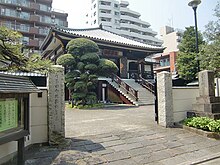Renkō-ji (蓮光寺, Renkōji) is a Buddhist temple in Tokyo, Japan. It is assumed to be the purported location of the ashes of Netaji Subhas Chandra Bose, Indian revolutionary, which have been preserved since September 18, 1945.[1] The small, well-preserved temple was established in 1594 inspired by the God of Wealth and Happiness.[clarification needed] It belongs to the Nichiren sect of Buddhism that believes that human salvation lies only in the Lotus Sutra.
| Renkō-ji | |
|---|---|
 Front view of the temple, May 2016 | |
| Religion | |
| Affiliation | Nichiren Buddhism |
| Location | |
| Location | 3‐30-20, Wada, Suginami-ku, Tokyo |
| Country | Japan |
| Architecture | |
| Completed | 1594 |
| Website | |
| None | |
Ashes of Subhash Chandra Bose
editAccording to the findings of the G.D. Khosla Commission, appointed by the Government of India in 1970, Subhash Chandra Bose's ashes were placed in the box at Taipei following the cremation of his remains.[2] Bose had died at Taihoku Army Hospital on August 18, 1945.[3] The ashes of Bose came to the temple for the purpose of a funeral ceremony but Rev. Mochizuki, father of the present Chief Monk, agreed to keep them in safe custody. Bose's funeral was held at 8:00 p.m. on September 18, 1945.[4]
Netaji’s associates observe his death anniversary on August 18 at the temple annually. It is customary for Indian officials arriving in Japan to travel to Renkoji, to offer prayers and pay respect to Bose at the pagoda that protects his remains: Prime Minister Jawaharlal Nehru was the first dignitary to visit the site in October 1957.[5] President Dr. Rajendra Prasad followed him a year later. Indira Gandhi visited in 1969.[6] Atal Bihari Vajpayee, former Prime Minister of India, first visited the temple during his term as Foreign Minister. He later visited it during his official visit to Japan on December 9, 2001. In 2000, the then Indian Minister of External Affairs, Jaswant Singh, visited the temple in November.
The ashes of Bose are placed in a small golden pagoda.[4]
Controversy
editThe Justice Mukherjee Commission of Inquiry submitted its report to the Indian Government on November 8, 2005. The report was tabled in Parliament on May 17, 2006. The probe said in its report that as Bose did not die in the plane crash, the ashes at the Renkoji Temple are not his. However, the Indian Government rejected the findings of the Commission.[7] Controversy increased when Prime Minister Narendra Modi did not visit the temple even when he was requested by the Indian High Commission in Japan.[8]
References
edit- ^ "Netaji's ashes still in Renkoji temple: MEA". DNA India. Mar 8, 2007. Retrieved 17 November 2013.
MEA has informed Delhi-based Mission Netaji that the alleged ashes and remains of the freedom fighter are still in Tokyo's Renkoji temple....In a letter dated March two this year, Additional Secretary Ajai Choudhary of the external affairs ministry informed Mission Netaji that "as far as the ministry was aware the alleged ashes and remains are still at the Renkoji temple
- ^ "Ashes at Renkoji temple are Bose's (Highlights of G. D. Khosla Commission Report)". Hindustan Times. Archived from the original on 24 October 2012. Retrieved 17 November 2013.
From the evidence discussed above, I am convinced beyond all reasonable doubts that the wooden casket lodged in the Renkoji Temple at Tokyo contains Bose's ashes and these ashes were placed in the box at Taipei after the cremation of his dead body
- ^ Krant, M. L. Verma (2006). Svadhinata Sangrama Ke Krantikari Sahitya Ka Itihasa (in Hindi). Vol. 3 (1 ed.). New Delhi: Praveen Prakashan. p. 846. ISBN 81-7783-120-8. OCLC 271682218.
On 18 Aug 1945 the weather over the Formosa Strait was extremely bad, so that the plane made a difficult voyage of several hours before it reached the Taihoku airfield at 13.00. After refueling it took off at 14.00. When it rose about 10 meters above ground the propeller of the left side left side engine fell apart. The plane shaking violently right and left, listed to the left and crashed against the ground at the end of the airfield. Fire broke out instantly at both front and rear of the plane. Bose drenched in gasoline and covered with flames emerged from a hole on the left side and towards the front of the fuseleg.... Ten minutes after the accident he was taken to the Army Hospital in Taihoku and received treatment at 15.00. His death came at 21.00. His aide H.R. also suffered burns to his neck, right cheek, right leg as well as both arms. Lieutenant General Shidei met an instantaneous death inside the plane (two others would similarly perish).
- ^ a b "【ボースの遺骨を守って】もう一つの日印交流(1)敗戦下の葬儀". Sankeishinbun. 2009-09-14. Archived from the original on 2009-09-24. Retrieved 2009-10-17.
- ^ "【ボースの遺骨を守って】もう一つの日印交流(2)ネールの礼状". Sankeishinbun. 2009-09-21. Archived from the original on 2009-09-29. Retrieved 2009-10-18.
- ^ "【ボースの遺骨を守って】もう一つの日印交流(3)「日印協会」の変遷". Sankeishinbun. 2009-09-28. Archived from the original on 2009-11-07. Retrieved 2009-10-17.
- ^ "Ashes in Renkoji Temple are of Netaji, say files". The Hindu. 24 January 2016. Retrieved 26 July 2022.
- ^ "Modi urged not to visit Renkoji temple". The Hindu. 31 August 2014. Retrieved 26 July 2022.
External links
edit- Temples Of Japan - More about Renkoji Temple
- Renkoji Temple, Tokyo - On google map